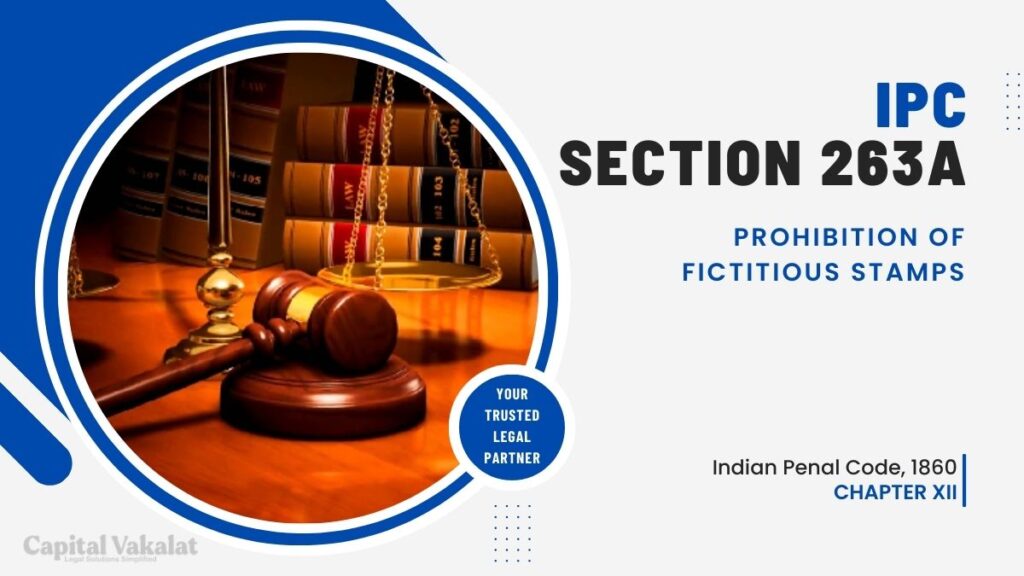The Indian Penal Code (IPC) is a comprehensive legal framework that addresses various criminal activities and offenses. Among its many sections, Section 263A stands as a vigilant guardian against the use of fictitious stamps.

In this article, we will delve into the significance of Section 263A IPC, its historical context, the provisions it contains, the penalties for violation, and its broader implications for stamp duties and revenue collection.
Introduction to Section 263A IPC
Section 263A of the IPC plays a pivotal role in the legal system of India. Its primary objective is to prohibit the use of fictitious stamps, which can be detrimental to the authenticity and legality of various documents and financial transactions. This section serves as a deterrent against individuals and entities attempting to manipulate stamps for unlawful purposes.
Historical Context
To understand the importance of Section 263A IPC, we must explore its historical context. In the past, the prevalence of fictitious stamps was a significant concern, leading to the inclusion of this section. Such stamps were used to facilitate fraudulent activities, thereby undermining the trust in legal documents and financial transactions.
Understanding Fictitious Stamps
Fictitious stamps are, at their core, counterfeit or forged stamps. They are created with the intent to deceive, often mimicking the appearance of genuine stamps used in legal and financial documents. These deceptive stamps can be used in various activities, including tax evasion, fraud, and other illegal schemes.
Provisions of Section 263A IPC
Section 263A IPC contains clear provisions that address the use of fictitious stamps. It empowers the legal authorities to take action against individuals or entities found guilty of using counterfeit stamps. This section not only identifies fictitious stamps but also sets forth measures to combat their use effectively.
Penalties and Consequences
The penalties associated with violating Section 263A IPC are stringent, reflecting the seriousness of this offense. Those found guilty of using fictitious stamps can face imprisonment and fines, underscoring the government’s commitment to eradicating this illegal activity. Such punitive measures are essential to deter potential offenders.
Importance of Stamp Duties
Stamp duties play a crucial role in the legal and financial landscape. They ensure the legality and authenticity of documents, such as agreements, contracts, and property transactions. Fictitious stamps pose a significant threat to the integrity of these duties, potentially causing legal disputes and financial losses.
Enforcement and Challenges
Enforcing Section 263A IPC can be a challenging endeavor. Identifying fictitious stamps and apprehending those responsible require specialized skills and resources. However, the successful application of this section in notable cases serves as a testament to the commitment of law enforcement agencies in combating this issue.
Impact on Revenue Collection
The prohibition of fictitious stamps is closely linked to revenue collection. When fictitious stamps are used, the government’s revenue collection is negatively impacted, as transactions may go unreported or underreported. By enforcing Section 263A IPC, the government can safeguard its revenue streams, which are essential for public welfare and development.
Preventing Fictitious Stamps
Preventing the use of fictitious stamps requires a multi-pronged approach. Firstly, raising awareness about the consequences of using counterfeit stamps is essential. Secondly, the integration of technology, such as digital verification systems, can help identify genuine stamps from fake ones, making it more challenging for offenders to succeed in their illegal activities.
Conclusion
Section 263A of the Indian Penal Code, with its focus on the prohibition of fictitious stamps, stands as a formidable guardian of the integrity of legal and financial documents. It serves as a deterrent against those who seek to manipulate stamps for illegal purposes and undermines the authenticity of various transactions. Strict enforcement of this section is imperative to safeguard revenue collection and maintain the sanctity of legal and financial dealings.
Frequently Asked Questions
What are the penalties for violating Section 263A IPC?
Violators of Section 263A IPC, who use fictitious stamps, can face imprisonment and fines. The severity of these penalties reflects the seriousness of the offense.
How do fictitious stamps impact revenue collection?
Fictitious stamps can lead to reduced revenue collection for the government, as transactions involving these stamps may go unreported or underreported. This affects the government’s ability to fund public welfare and development programs.
What measures can be taken to prevent the use of fictitious stamps?
Preventing fictitious stamps involves raising awareness about their consequences and implementing technology, such as digital verification systems, to differentiate genuine stamps from fake ones.
Why is Section 263A IPC essential in maintaining the authenticity of legal and financial documents?
Section 263A IPC plays a vital role in upholding the integrity of legal and financial documents by prohibiting the use of fictitious stamps. It ensures that transactions and agreements are legally binding and authentic, without the risk of manipulation through counterfeit stamps.